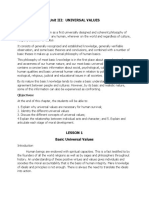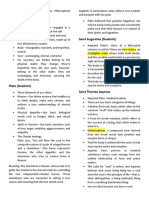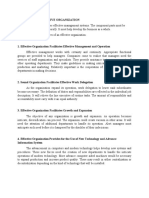Religion and Ethics
Religion and Ethics
Uploaded by
CocoCopyright:
Available Formats
Religion and Ethics
Religion and Ethics
Uploaded by
CocoCopyright
Available Formats
Share this document
Did you find this document useful?
Is this content inappropriate?
Copyright:
Available Formats
Religion and Ethics
Religion and Ethics
Uploaded by
CocoCopyright:
Available Formats
Religion and Ethics
Practically, ethics may be defined as a system of moral principles which affect how people
make decisions and lead their lives. Ethics is concerned with what is good and right for a
person and society.
On the other hand, religion is defined as “people and opinions concerning the existence,
nature, and worship of a deity or deities, and divine involvement in the universe and human
life” (Religion, 2009). Referring to the sacred engagement with that which is believed to be a
spiritual reality, religion denotes the belief in, or the worship of, a god (or gods) and the
worship or service to God or the Supernatural.
A religion is also viewed as an organized collection of beliefs, cultural systems, and
worldviews that relate humanity to an order of existence (Religion, n.d). Many religions
possess Holy Scripture, narratives, or sacred accounts that aim to explain the origin and
meaning of life and the universe.
Religion’s Role in Ethics
Many ethicists believe that the religion is necessary for the continued survival of morality as
an integral part of human life, especially in a globalized world. University of Tennessee,
Knoxville (UTK) Philosophy professor Glenn C. Graber calls this apologetic claim the ‘cut-
flowers thesis’ (1922, pp.1-5) which consists of hypothetical judgment that, “Morality cannot
survive, in the long run, if its ties to religion are cut.” This proposition is a prediction of what
would happen to morality if it were severed from religion. In 1984, Russian writer Leo
Tolstoy (1828-1910) made the following early statement of this thesis.
The cut-flower thesis thus implies that those who believe that morality is a valuable human
institution, and those who wish to avoid moral disaster, should therefore make every effort to
preserve its connection with the true religion and the sound religious belief that forms its
roots. As morality is currently in a withering stage in this globalized era, its decline can be
identified with the exorbitant secularization of many things. Support for this claim be found
both among those sympathetic to religion and surprisingly enough, among those with little or
no sympathy for religion.
All these statements call attention to the prediction of the cut-flower thesis which, by way of
summary, suggests that morality cannot survive without religion. Some words of caution are
needed here though: The cut-flower thesis does not say that a consequence of abandoning
religion leads immediately to murder, rape, robbery, drunkenness, sexual promiscuity, and
the like. Nor does it say that the morality per se will soon cease to exist if its ties to religion
are cut. However, it does argue that to have a real ground no reason for moral action; one
must admit a religious or theological foundation.
Theistic Ethics
Religions fundamentally endorse theism (the belief in God) and theistic ethics (God-based
morality). Theistic ethics believes that a supernatural being called God is the foundation of
morality. God is viewed as true source of all moral laws, and as the only plausible cause of
moral obligations which possess overriding and binding character.
Theism claim that unlike secularists’ ethical theories, this moral system which is also called
moral supernaturalism can satisfactorily explain the existence of objective ethical values
and the moral law.
You might also like
- Get The Christian Theological Tradition 4th Edition Mark Mcinroy Editor Michael J Hollerich Editor Free All ChaptersDocument64 pagesGet The Christian Theological Tradition 4th Edition Mark Mcinroy Editor Michael J Hollerich Editor Free All ChapterskahunenemNo ratings yet
- Close Up Vocab C1Document3 pagesClose Up Vocab C1Tan Lee Yin100% (1)
- The HexagrammatonDocument385 pagesThe Hexagrammatonzaki100% (6)
- Ethics - Ethics & ReligionsDocument13 pagesEthics - Ethics & ReligionsCarlo Lopez Cantada100% (1)
- Handbook ELE 0910Document52 pagesHandbook ELE 0910NIST Ele ICT DepartmentNo ratings yet
- ETHICSDocument77 pagesETHICSLouise EulogioNo ratings yet
- Mod1 3Document19 pagesMod1 3Guki SuzukiNo ratings yet
- Ethics IntroductionDocument33 pagesEthics IntroductionExekiel Albert Yee Tulio100% (1)
- Activities in Chapter 4 (Lesson 2)Document3 pagesActivities in Chapter 4 (Lesson 2)Juneriza SamsonNo ratings yet
- Who Is A Moral AgentDocument8 pagesWho Is A Moral AgentRaymer Oclarit100% (2)
- Ethics Chapter 3Document12 pagesEthics Chapter 3EVANGELISTA REYMUND V.No ratings yet
- Cultural RelativismDocument2 pagesCultural RelativismAdriatik Meta100% (1)
- Module 04 Moral Dilemma PrintDocument4 pagesModule 04 Moral Dilemma PrintCrismar Froilan LimasNo ratings yet
- CHAPTER 1 The Study of Ethics: Mystical Rose College of Science and TechnologyDocument4 pagesCHAPTER 1 The Study of Ethics: Mystical Rose College of Science and TechnologyCarp EvaNo ratings yet
- The Moral Agent and The Morality of Human ActDocument4 pagesThe Moral Agent and The Morality of Human ActFerrer CherrieNo ratings yet
- G.E. 8 Ethics M3L2Document3 pagesG.E. 8 Ethics M3L2Charmine AlbaoNo ratings yet
- Lesson 4 - The Human Act As Knowingly Done - IgnoranceDocument13 pagesLesson 4 - The Human Act As Knowingly Done - IgnorancejeNo ratings yet
- Philo 700Document4 pagesPhilo 700Robert NeroNo ratings yet
- Scientism Methods of Natural Science Should Be Bar by Which EveryDocument3 pagesScientism Methods of Natural Science Should Be Bar by Which EveryMark SeraNo ratings yet
- KantDocument7 pagesKantTomNo ratings yet
- Why Should I Be Moral?Document1 pageWhy Should I Be Moral?Bang BangNo ratings yet
- Lessons in This Module Lesson 1: Duty and Agency Lesson 2: Autonomy Lesson 3: UniversalizabilityDocument8 pagesLessons in This Module Lesson 1: Duty and Agency Lesson 2: Autonomy Lesson 3: UniversalizabilityMia ManguiobNo ratings yet
- Institute of Arts and SciencesDocument7 pagesInstitute of Arts and SciencesArnel Pamaos Lopiba MontañezNo ratings yet
- Unit III Module in EthicsDocument22 pagesUnit III Module in EthicsTelly PojolNo ratings yet
- Group 8. Ethical RequirementsDocument12 pagesGroup 8. Ethical RequirementsArisa AdaoNo ratings yet
- UTS Module 7-9Document22 pagesUTS Module 7-9mikaela thereseNo ratings yet
- General Ethics: The Importance of EthicsDocument2 pagesGeneral Ethics: The Importance of EthicsLegendXNo ratings yet
- Virtue, The Mean, and Practical Wisdom: Lucas, Margie E. Pagutlan, Lizalyn SDocument47 pagesVirtue, The Mean, and Practical Wisdom: Lucas, Margie E. Pagutlan, Lizalyn SEloisa Joy Moredo100% (1)
- Gethics Midterm PDFDocument6 pagesGethics Midterm PDFMark HerreroNo ratings yet
- Virtue Ethics (Aristotle)Document19 pagesVirtue Ethics (Aristotle)Alfred LopezNo ratings yet
- Group 1, Culture in Moral BehaviorDocument17 pagesGroup 1, Culture in Moral BehaviorLOUIS ADONIS SILVESTRENo ratings yet
- Reflection Paper Ethics - Paolo JavierDocument3 pagesReflection Paper Ethics - Paolo JavierPJ Javier100% (1)
- Freedom and Moral Act: Sense of Right and Wrong. They Are Not Moral Beings Like HumansDocument4 pagesFreedom and Moral Act: Sense of Right and Wrong. They Are Not Moral Beings Like HumansKleo OrtizNo ratings yet
- Physical SelfDocument48 pagesPhysical SelfCharlene MalantaNo ratings yet
- RobinhoodDocument2 pagesRobinhoodRecaNo ratings yet
- Universal ValuesDocument3 pagesUniversal Valuesrotsacreijav666666No ratings yet
- What Is EthicsDocument16 pagesWhat Is EthicsAnsh PreetNo ratings yet
- GNED 02 Learning Guide PDFDocument6 pagesGNED 02 Learning Guide PDFZed DeguzmanNo ratings yet
- Group I - Ethics and CultureDocument20 pagesGroup I - Ethics and CultureJacqueline CarbonelNo ratings yet
- Good Morning: Topics For Today: Introduction To Ehtics Virtue Ethics & Aristotle - Eudaimonia - The SoulDocument19 pagesGood Morning: Topics For Today: Introduction To Ehtics Virtue Ethics & Aristotle - Eudaimonia - The SoulPamela MorcillaNo ratings yet
- MIDTERM Test - Art Appreciation - QuizletDocument10 pagesMIDTERM Test - Art Appreciation - QuizletSherwin Buenavente SulitNo ratings yet
- Ethical Schools of ThoughtDocument5 pagesEthical Schools of ThoughtIza Alto100% (1)
- Ethics VoluntarinessDocument24 pagesEthics VoluntarinessWayne Bruce0% (1)
- Week 2-Mt Lesson Gec 8 EthicsDocument12 pagesWeek 2-Mt Lesson Gec 8 EthicsBenBhadzAidaniOmboyNo ratings yet
- What Is Ethical RelativismDocument1 pageWhat Is Ethical Relativismsubhashis87No ratings yet
- Module 4 EthicsDocument95 pagesModule 4 EthicsJovie Agcaoili100% (1)
- Lesson 1Document3 pagesLesson 1Jesslee Edaño TaguiamNo ratings yet
- Final Requirement in UTSDocument6 pagesFinal Requirement in UTSArlane AlonNo ratings yet
- Reflection PaperDocument5 pagesReflection Paperapi-339437007No ratings yet
- Selfie Telemedicine SlidesDocument6 pagesSelfie Telemedicine SlidesKarl Cedric B. NatavioNo ratings yet
- Reviewer in EthicsDocument9 pagesReviewer in EthicsIsla DianaNo ratings yet
- Ethics ModuleDocument7 pagesEthics ModuleKarl CedricNo ratings yet
- Philippine English 1.3 1Document16 pagesPhilippine English 1.3 1U M UNo ratings yet
- The Material / Economic Self: However, MDocument10 pagesThe Material / Economic Self: However, MAngela Venice MiguelNo ratings yet
- Module 1 (What Is Ethics)Document11 pagesModule 1 (What Is Ethics)Mish Lei FranxhNo ratings yet
- Self in Western and Eastern Thought PDFDocument2 pagesSelf in Western and Eastern Thought PDFINTALAN, FRITZ L.100% (1)
- Unit 5 Ethics PDFDocument7 pagesUnit 5 Ethics PDFangel parungaoNo ratings yet
- Worksheet 3Document8 pagesWorksheet 3Joseph Enoch Elisan100% (3)
- Moral Theories and Mental Frames: By: Prof. Katherine E. Evasco Sociology Department, BUCSSPDocument14 pagesMoral Theories and Mental Frames: By: Prof. Katherine E. Evasco Sociology Department, BUCSSPNathaniel RemendadoNo ratings yet
- The Nature of The TheoryDocument2 pagesThe Nature of The TheoryFrances FuensalidaNo ratings yet
- Ethics Week 4-5Document15 pagesEthics Week 4-5Sir BenchNo ratings yet
- Reason and Impartiality: EthicsDocument39 pagesReason and Impartiality: EthicsDiane RamentoNo ratings yet
- Role of ReligionDocument5 pagesRole of Religionaleli sorianoNo ratings yet
- Lesson Iii 1Document70 pagesLesson Iii 1kristvillarealNo ratings yet
- Millennials and MillennialsDocument2 pagesMillennials and MillennialsCocoNo ratings yet
- Customs JurisdictionDocument2 pagesCustoms JurisdictionCocoNo ratings yet
- Kantian EthicsDocument3 pagesKantian EthicsCocoNo ratings yet
- Goods DeclarationDocument3 pagesGoods DeclarationCocoNo ratings yet
- Introduction To Monetary PolicyDocument1 pageIntroduction To Monetary PolicyCocoNo ratings yet
- Features of Effective OrganizationDocument6 pagesFeatures of Effective OrganizationCocoNo ratings yet
- Bill To: Smart Printing Solutions LTDDocument8 pagesBill To: Smart Printing Solutions LTDShanto N ShanNo ratings yet
- Allotment List - Dissertation TopicsDocument5 pagesAllotment List - Dissertation TopicsanudeepNo ratings yet
- Hispanic Day PresentationDocument7 pagesHispanic Day PresentationVirginia Perez JimenezNo ratings yet
- O Level Computer Science Paper 2 Topical by Sir Ubair Khan 01-01-24Document25 pagesO Level Computer Science Paper 2 Topical by Sir Ubair Khan 01-01-24saad2000hamza22No ratings yet
- Labour LawDocument19 pagesLabour LawPrasenjit TripathiNo ratings yet
- Human Resource Management: Manas Ranjan Tripathy IBS, HyderabadDocument23 pagesHuman Resource Management: Manas Ranjan Tripathy IBS, HyderabadGazal GuptaNo ratings yet
- REPORT (No Copyright Infringement Intended)Document30 pagesREPORT (No Copyright Infringement Intended)FEBELOU BONOCANNo ratings yet
- Action Plan - LunduyanDocument1 pageAction Plan - LunduyanMinnie Avelino100% (1)
- Numericals On National Income Value Added MethodDocument3 pagesNumericals On National Income Value Added Methodpahel38443No ratings yet
- Business Law and Regulation Quiz 1Document5 pagesBusiness Law and Regulation Quiz 1Jennica Mae RuizNo ratings yet
- A Presentation On Disciplinary ActionDocument24 pagesA Presentation On Disciplinary ActionAhel Patrick VitsuNo ratings yet
- Dissertation Structure UwlDocument8 pagesDissertation Structure UwlCustomPaperUK100% (1)
- BioDocument1 pageBiojustin LimnardyNo ratings yet
- Noa MPT Mock Exam 17 Nov 2023Document83 pagesNoa MPT Mock Exam 17 Nov 2023Daniyal AliNo ratings yet
- March-2024-Smart PhoneDocument27 pagesMarch-2024-Smart PhoneUjjwal VermaNo ratings yet
- Assignment On Adonais (Likes & Dislikes)Document4 pagesAssignment On Adonais (Likes & Dislikes)Mr OreoNo ratings yet
- Folk-Lore Ambrose Merton (The - Athenaeum - 1846-08-22)Document1 pageFolk-Lore Ambrose Merton (The - Athenaeum - 1846-08-22)zülal söğütNo ratings yet
- 2024-2025 SOW - Caribbean Studies - Term 1Document3 pages2024-2025 SOW - Caribbean Studies - Term 1Isaiah RojasNo ratings yet
- In Human Resource Management, POSNER, RANDOLPH, Y WORTMAN, 1975Document6 pagesIn Human Resource Management, POSNER, RANDOLPH, Y WORTMAN, 1975Paulina PicoNo ratings yet
- Bates V Post Office: Louise Dar Witness StatementDocument31 pagesBates V Post Office: Louise Dar Witness StatementNick Wallis100% (1)
- Supermarkets in The Philippines AnalysisDocument2 pagesSupermarkets in The Philippines AnalysisAndrea YvestroNo ratings yet
- Dating SystemsDocument16 pagesDating SystemsBaraCudaNo ratings yet
- Arte Povera - Third-Worldist Art Germano CelantDocument24 pagesArte Povera - Third-Worldist Art Germano CelantToby J Lloyd-JonesNo ratings yet
- FIN301 Group AssignmentDocument12 pagesFIN301 Group AssignmentRahat KhanNo ratings yet
- 9 Interest and DepreciationDocument24 pages9 Interest and DepreciationSmoky SimpsonNo ratings yet
- Electrocyclic Reactions (CHEM-311)Document16 pagesElectrocyclic Reactions (CHEM-311)Khadija MazharNo ratings yet































































































